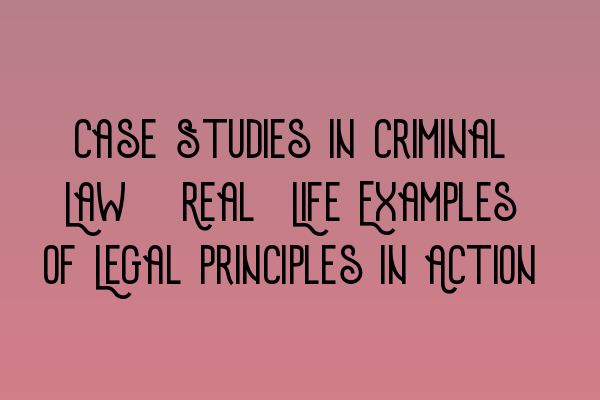Case Studies in Criminal Law: Real-Life Examples of Legal Principles in Action
In the world of criminal law, legal principles come to life through real-life case studies. These case studies provide valuable insights into the application of the law and how it affects individuals and society as a whole. By examining these examples, we can better understand the intricacies of criminal law and how it is enforced.
AH v. The Crown: The Burden of Proof
In the case of AH v. The Crown, the principle of the burden of proof was put to the test. AH was charged with a serious crime, but the evidence against him was circumstantial. The Crown had to prove beyond a reasonable doubt that AH was guilty. Despite the lack of direct evidence, the court found AH guilty based on the cumulative weight of the circumstantial evidence. This case demonstrates the importance of the burden of proof and the standard required to secure a conviction.
Related Article: Demystifying the Solicitors Qualifying Examination Format
RC v. The State: Self-Defense and Reasonable Force
RC found himself in a volatile situation where his life was at risk. He used force to defend himself, resulting in the death of his attacker. In RC v. The State, the court had to determine whether RC’s use of force was reasonable given the circumstances. The court found that RC acted in self-defense and used reasonable force, acquitting him of the charges. This case highlights the delicate balance between self-defense and the appropriate use of force in criminal law.
Related Articles: LLC Formation Made Simple: Step-by-Step Guide for UK Entrepreneurs, LLC Formation: A Step-by-Step Guide for UK Entrepreneurs
PC v. The Crown: Insanity Defense
PC was charged with a serious crime but claimed that he was not criminally responsible due to a mental illness. In PC v. The Crown, the court had to evaluate PC’s mental state at the time of the offense and determine if he met the requirements for the insanity defense. After expert psychiatric testimony, the court found PC not guilty by reason of insanity. This case highlights the complexities of mental illness and its impact on criminal responsibility.
Related Article: Business Regulations in the UK: A Comprehensive Overview
JT v. The State: Sentencing and Rehabilitation
JT pleaded guilty to a serious offense but argued for a lenient sentence based on his willingness to undergo rehabilitation. In JT v. The State, the court had to balance the need for punishment with the potential for rehabilitation. The court ultimately imposed a sentence that included a rehabilitation program, recognizing the potential for JT’s reform. This case illustrates the importance of considering rehabilitation as a component of sentencing in criminal law.
Related Article: Decoding Corporate Structures: A Comprehensive Legal Insight
Conclusion
These case studies offer valuable insights into the principles that govern criminal law. From the burden of proof to self-defense, mental health, and sentencing, these examples demonstrate how the law is applied in real-life situations. By analyzing these cases, we gain a deeper understanding of criminal law and the complexities involved. To learn more about the legal profession and related topics, be sure to check out our related articles on the SQE Criminal Law & Practice Law UK website.
